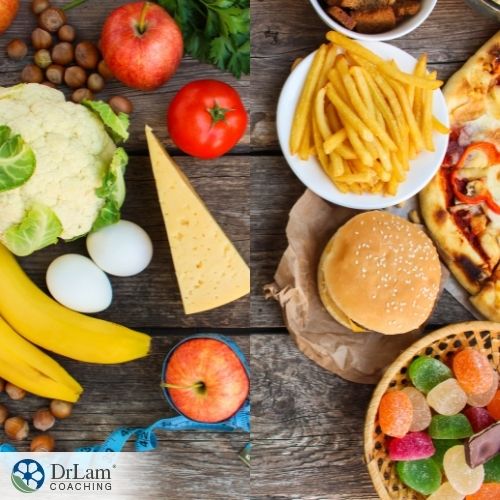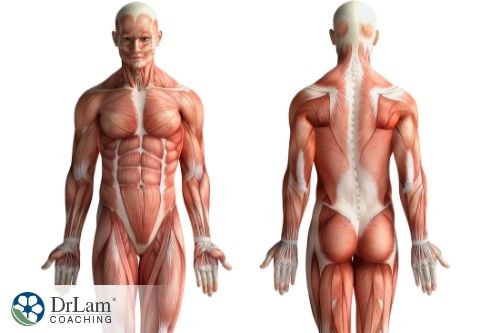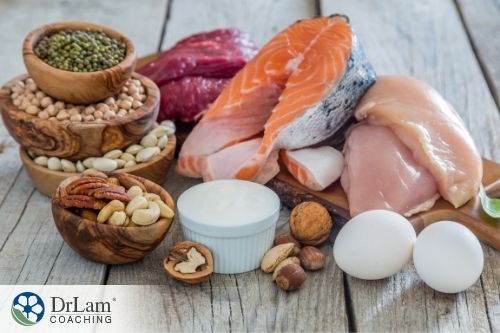 Many years ago, the "low-fat diet" idea was made popular. We were told, "Fat is bad for you. If you want to be thin, eat low-fat foods!" Many food producers jumped onto the bandwagon, offering low-fat options. But when producers started eliminating fats from their products, they had a problem. The foods tasted bland without fat. So, what did they do? They added sugar. So, while people opted out of a high-fat diet and bought low-fat foods, they also gained weight due to the extra sugar. Advertisements 20 years ago proclaimed that sugar gives energy. Well, it also packs on the pounds and contributes to heart disease, amongst many other health issues.
Many years ago, the "low-fat diet" idea was made popular. We were told, "Fat is bad for you. If you want to be thin, eat low-fat foods!" Many food producers jumped onto the bandwagon, offering low-fat options. But when producers started eliminating fats from their products, they had a problem. The foods tasted bland without fat. So, what did they do? They added sugar. So, while people opted out of a high-fat diet and bought low-fat foods, they also gained weight due to the extra sugar. Advertisements 20 years ago proclaimed that sugar gives energy. Well, it also packs on the pounds and contributes to heart disease, amongst many other health issues.
Generally speaking, a low-fat diet consists of foods low in fat but higher in sugar. The average American consumes about 152 pounds of sugar per year. That is about 6 cups a week. Taking this into consideration, a high-fat diet may prove a better dietary option in the long run!
Sugar is a simple carbohydrate, like white flour. It quickly turns into glucose for use. Simple carbohydrates add to your body’s blood sugar levels. Complex carbohydrates, on the other hand, take longer to digest and turn into glucose, keeping blood sugar lower.
In more recent times, high-fat/low-carb diets have become popular. But while this type of diet has its advantages, it also creates certain potential problems.
More recently, many people have started following a high-fat diet while reducing their carbohydrate consumption. People struggling to lose weight have found this type of dietary approach works. And it does.
A diet high in carbohydrates sees your body getting its energy from glucose that comes from carbohydrates. But when your carbohydrate intake is high, your body has more glucose than it can use. It then stores the additional glucose as fat.
A high-fat diet, on the other hand, sees your body using ketones from the fat you eat for energy. But the very process of deriving these ketones from fat uses up a lot of energy as well. So essentially, your body is working to get energy, which uses up a lot of energy, and thus may result in weight loss.
Furthermore, a high-fat diet quickly gives you a feeling of fulness, with many people eating less than they would with a diet high in carbohydrates. In many cases, this type of diet may have a beneficial effect for those suffering from heart disease, certain types of cancer, type-2 diabetes, and even Alzheimer’s disease.
So you should ditch all carbohydrates and eat lots of fats, right?
Not necessarily. Research also shows that a high-fat diet that is extremely low in carbohydrates could lower your body’s defense against certain chronic health issues.
Now that we have taken a brief look at a high-fat diet low in carbohydrates, we will take a look at a diet high in fats and compare it to one low in fats.
 Popular high-fat diets currently doing the rounds include the ketogenic diet and the Atkins diet. Unfortunately, not much literature on the long-term effects of such a diet exists. They do show promising results when it comes to weight loss.
Popular high-fat diets currently doing the rounds include the ketogenic diet and the Atkins diet. Unfortunately, not much literature on the long-term effects of such a diet exists. They do show promising results when it comes to weight loss.
One study, however, shows that when you follow a diet low in carbohydrates for an extended period, you could increase your risk of stroke, heart disease, and certain types of cancer.
Fats are not only in animal products. Many dietary fats occur in plants. Fats play an important role in body function, such as the making of hormones, the storage of energy, and nerve cell function, amongst others.
Most saturated fats are found in meat and dairy products. They also occur in tropical oils like coconut oil and palm oil. These fats tend to stay in a solid state when at room temperature. Although too many saturated fats could contribute to your cholesterol count and increase your risk of heart disease, healthy people can consume them. Taken in moderation, saturated fats are not bad for you.
Unsaturated fats, typically liquid at room temperature, mainly come from plant sources. Examples include olive oil, canola oil, and oils in avocadoes, seeds, and nuts. Animal sources include fatty fish such as mackerel, herring, salmon, and tuna. Unsaturated fats are considered healthy fats because they may reduce cholesterol levels and help protect against heart disease.
You should try to avoid trans fats as much as possible. These fats, often listed on food labels as partially hydrogenated oils, go through a process that modifies their structure so that they stay solid while at room temperature. Margarine is an example. These fats are linked to many health issues, including certain types of cancer, type-2 diabetes, and heart disease. You often find trans fats in baked goods, fast food, and processed foods.
A low-fat diet is typically one where dietary fat makes up under 30 percent of your food intake. Those in the medical profession may often advise this type of diet for weight loss, to help with metabolic control, or for those suffering from heart disease or diabetes. But do remember your body needs a certain amount of fat to function correctly, especially unsaturated fats and omega-3s. Some fat is needed for heart, nerve, and brain health.
But while a low-fat diet does have certain health benefits for people who have certain health issues, healthy individuals do not need to follow this type of diet.
So all fats are not necessarily bad for you. You could also potentially lose weight with a high-fat diet like the keto diet. But there are also drawbacks to a high-fat diet, and it's best to keep things balanced as far as possible.
A diet high in trans fats and saturated fats could increase your bad cholesterol and contribute to inflammation and heart disease, stroke, and other problems.
Furthermore, a high-fat diet - especially one low in complex carbohydrates - may also influence your gut bacteria composition, encouraging the growth of ‘bad’ bacteria and inflammation. Your gut bacteria need complex carbs to thrive. However, a low-fat diet is not good for your gut bacteria either.
This is why best diet to follow is likely one that incorporates a variety of foods, including healthy fats, plenty of fruit and vegetables, and lean protein. In other words, your body is best able to protect itself from health issues when you eat a balanced diet.
 Bioenergetics refers to the energy flow through a biological system, such as your body. It has to do with the conversion of fats, carbohydrates, and proteins into the micronutrients your body uses for energy.
Bioenergetics refers to the energy flow through a biological system, such as your body. It has to do with the conversion of fats, carbohydrates, and proteins into the micronutrients your body uses for energy.
The organs most involved in this process are the liver, pancreas, and thyroid gland. Their primary function is the production of energy needed by each cell to correctly carry out its function.
Your bioenergetics circuit makes up part of your NeuroEndoMetabolic (NEM) stress response, which is part of how your body responds to stress. Constant stress may cause problems for your adrenals, your primary stress responders, which produce hormones that also control your bioenergetics circuit. This can lead to problems like adrenal fatigue, hypothyroidism, and weight gain that is difficult to lose.
Health issues commonly associated with a bioenergetics dysfunction include, amongst others, diabetes, hypoglycemia, obesity, sleep disorders, inflammation, and gut disorders.
High sugar consumption forces your pancreas to work harder at balancing your blood sugar levels. It could also result in increased inflammation which makes it more difficult for your pancreas to function properly.
Your thyroid, which makes hormones involved in the metabolic process and energy production, may also be affected by a stressed pancreas, and when poor gut health is added to the mix, hypothyroidism could develop. This could cause weight gain and affect many other processes.
The liver, your body’s main detoxifier, is guided in its function by your insulin levels. Lower blood sugar levels cause your liver to release stored glucose. If a bioenergetics circuit dysfunction occurs, the liver may struggle to get rid of toxins which could result in increased inflammation.
To keep this system in shape, your body needs fats, carbohydrates, and proteins. What is important, however, is to ensure your diet includes a healthy balance of these nutrients. A high-fat diet may work for weight loss, but perhaps another option would be healthier in the long run.
 The typical western diet is one high in animal proteins, refined sugar, and fried foods, while low in complex carbohydrates. These include whole grains, pulses, and vegetables. This type of diet also reduces good gut bacteria, thereby causing gut health issues that reduce your overall health. Your gut, just like the bioenergetics circuit, also plays a crucial part in your NEM stress response.
The typical western diet is one high in animal proteins, refined sugar, and fried foods, while low in complex carbohydrates. These include whole grains, pulses, and vegetables. This type of diet also reduces good gut bacteria, thereby causing gut health issues that reduce your overall health. Your gut, just like the bioenergetics circuit, also plays a crucial part in your NEM stress response.
Any diet where you completely cut out one food type while loading up on another is risky at best. A healthy balance is necessary to ensure your body gets an adequate supply of all the nutrients it needs to function correctly.
When looking at different populations and their eating habits, scientists rate how healthy they are by their obesity, heart disease, and type-2 diabetes statistics. Where these are low, their diet is often a healthy, balanced one.
People from Japan tend to live longer and have a healthier body weight than their western counterparts. This is due to their diet, which contains little refined sugar and animal protein, but is high in fresh vegetables and fish.
Another diet that westerners may find easier to follow is the Mediterranean diet. This balanced diet contains lots of plant fiber, fresh fruit, and vegetables, and a moderate amount of fish and meat. People in these areas of Europe tend to have a healthier body weight and better heart health with obesity a rare occurrence.
Another diet to consider, the adrenal fatigue diet, is high in fiber, fresh fruit, and vegetables, and includes a variety of healthy fats that provides adrenal support.
If you are worried about your weight and want to consider a high-fat diet, here are a few things to remember:
If you would like to know more about the pros and cons of a high-fat diet, the team at Dr. Lam Coaching can help. We offer a free** no-obligation phone consultation at +1-626-561-1234. We will privately discuss your options with you. You can also send us a question through our Ask The Doctor system by clicking here.
No diet can guarantee weight loss. Many people have, however, been successful following a high-fat diet. But please take note that such a diet may have certain deficiencies that could have some serious repercussions for your health. Always first consult a healthcare professional before starting a new diet.
